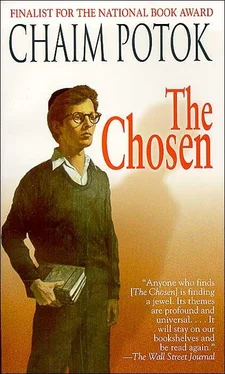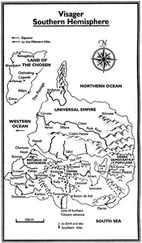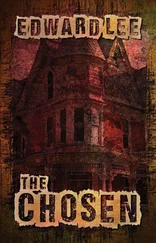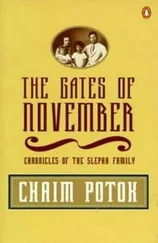I went home, feeling sad and a little helpless. Danny would have to work out his own problem. I couldn't help him much with psychology.
The second semester of college began the following Monday, and during lunch Danny told me he planned to speak to Professor Appleman that afternoon. He looked tense and nervous. I suggested that he be polite but honest, and that he listen to what Appleman might have to say. I was a little nervous myself, but I told him I had done some reading in experimental psychology on Friday and that I thought it had a lot to contribute. How could you have a science without experimentation? I wanted to know. And how could anyone experiment on the unconscious, which, by definition, seemed to defy laboratory techniques of testing?
I saw Danny become tight-lipped with anger.
'Thanks a lot,' he said bitterly. 'That's just what I need now. A kick in the pants from my best friend.'
'I'm telling you how I feel,' I said.
'And I'm telling you how I feel' he almost shouted. 'Thanks a million!'
He stormed angrily out of the lunchroom, leaving me to finish the meal alone.
We usually met outside the building after our final class and went home together, but that evening he didn't show up. I waited about half an hour, then went home alone. The next morning, as I walked up Lee A venue, I saw him waiting for me in front of the synagogue where my father and I prayed.
'Where were you last night?' he asked.
'I waited half an hour,' I said. 'What time did you get out?'
'A quarter after seven.'
'You were with him an hour?'
'We had a long talk. Listen, I'm sorry I blew up like that yesterday at lunch.'
I told him I had a pretty thick skin and, besides, what was a friend for if not to be blown up at every now and then.
We were walking toward the trolley station. It was a bitter cold morning. Danny's earlocks lifted and fell in the stiff wind that blew through the streets.
'What happened?' I asked.
'It's a long story,' Danny said, looking at me sideways and grinning. 'We had a long talk about Freud, Freudians, psychology, psychoanalysis, and God.'
'And?'
'He's a very fine person. He said he's been waiting all term for me to talk to him.'
I didn't say anything. But now I was grinning.
'Anyway, he knows Freud forwards and backwards. He told me that he wasn't objecting to Freud's conclusions as much as to his methodology. He said Freud's approach was based on his own limited experiences. He generalized on the basis of a few instances. a few private patients.'
'That's the problem of induction in a nutshell,' I said. 'How do you justify jumping from a few instances to a generalization?'
'I don't know anything about the problem of induction,' Danny said. 'That's your department. Appleman said something else, though, that made a lot of sense to me. He admitted that Freud was a genius and a cautious scientist, but he said that Freud evolved a theory of behavior based only on the study of abnormal cases. He said that experimental psychology was interested in applying the methodology of the natural sciences to discover how all human beings behaved. It doesn't generalize about personality behavior only on the basis of a certain segment of people. That makes a lot of sense.'
'Well, well,' I said, grinning broadly.
'He also said his quarrel was mainly with the Freudians, not so much with Freud himself. He said they were happy to earn their fat fees as analysts and refused to let anyone challenge their hypotheses.'
'There's our trolley,' I said. 'Come on!'
The trolley was waiting for a light, and we made it just in time.
Some of the people inside stared curiously at Danny as we went up the aisle looking for seats. I had grown accustomed to people staring at Danny, at his beard and side curls. But Danny had become increasingly self-conscious about his appearance ever since the time he had read Graetz on Hasidism. He looked straight ahead, trying to ignore the stares. We found seats in the rear of the trolley and sat down.
'So he said analysts don't let anyone challenge their hypotheses,' I said. 'What happened then?'
'Well, we talked a lot about experimental psychology. He told me that it was almost impossible to study human subjects because it was too difficult to control the experiments. He said we use rats because we can vary the conditions. He repeated a lot of things he'd already said in class, but he made a lot more sense this time. At least, I think he made a lot more sense. Maybe after what he said about Freud being a genius I was just more willing to listen to him. He said he admired my knowledge of Freud but that in science no one was God, not even Einstein. He said even in religion people differed about what God was, so why shouldn't scientists take issue with other scientists? I couldn't argue with that. He said experimental psychology would be a healthy balance to my knowledge of Freud. Maybe. I still don't think it has anything to do with the human mind. It's more physiology than anything else, I think. Anyway, Appleman told me that if I had any problem with math he was willing to 'help me as much as he could. But his time is limited, he said, so he suggested I get a friend to help me on a regular basis: I didn't say anything.
He looked at me and grinned.
'Okay: I said. 'I don't charge very much: 'It won't make me love running rats through mazes: Danny said. 'But at least he's sympathetic. He's really a fine person: I smiled at him but didn't say anything. Then I noticed the psychology textbook he was carrying. It was one of the books I had seen on Friday that didn't mention Freud once. I asked him what he thought of it, and he said it was a grind. 'If I ever get to love experimental psychology after this book I'll assume the Messiah has come.' he said.
'Well, just call on your friendly tzaddik for help.' I told him. He looked at me queerly.
'I meant me.' I said.
He looked away and didn't say anything. We rode the rest of the way to school in silence.
So I began coaching Danny in math. He caught on very quickly, mostly by memorizing steps and procedures. He wasn't really interested in the why of a mathematical problem but in the how. I enjoyed coaching him and learned a lot of experimental psychology. I found it fascinating, a lot more substantial and scientific than Freud had been, and a lot more fruitful in terms of expanding testable knowledge on how human beings thought and learned.
Throughout the early weeks of February, Danny and I met in the lunchroom, sat at a table by ourselves, and discussed the difficulties he was having with his mathematical translations of psychological experiments. I showed him how to set up his graphs, how to utilize the tables in his textbook, and how to reduce experimental findings to mathematical formulas. I also kept arguing for the value of experimentation. Danny remained convinced of his original argument that experimental psychology had nothing to do with the human mind, though he began to see its value as an aid to learning theory and intelligence testing. His frustration over it 'went up and down like a barometer, the climate being the extent to which he was able to comprehend and resolve whatever mathematical problem preoccupied him at any given moment.
I saw very little of my father during those early weeks of February. Except for breakfast, supper, and Shabbat, he was never home. Sometime between eleven and twelve every night, he would return from wherever he had been, have a glass of tea, spend a few minutes with me in my room, then go into his study. I never knew what time he went to bed, though his tired, stooped body and his haggard face made it clear that he was sleeping very little. He had gone for his checkup, and Dr Grossman had been satisfied with his health, though he had suggested that he get more rest. My father took a vitamin pill every morning now with his orange juice, but they didn't seem to be doing much good. He completely ignored Dr Grossman's suggestion that he rest more, and every time I brought up the subject he either waved it away or talked about the violence flow going on in Palestine. It was impossible to talk to him about his health. There was nothing more important to him now than the two ideas around which his life revolved: the education of American Jewry and a Jewish state in Palestine. So he continued teaching his adult classes and planning for the Madison Square Garden rally due to take place in the last week of February.
Читать дальше












